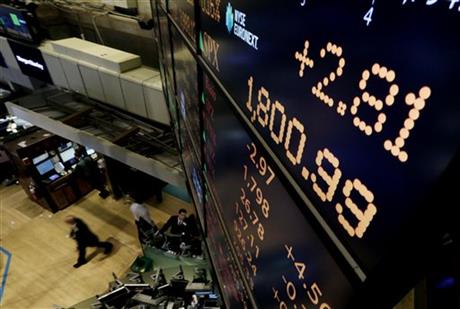
By SARAH DiLORENZO
A board above the trading floor of the New York Stock Exchange shows the Standard & Poor’s 500 index above 1,800, Monday, Nov. 18, 2013. The DJIA crossed 16,000 points for the first time early Monday and the Standard & Poor’s 500 index crossed 1,800 points. (AP Photo/Richard Drew)
Jeffrey Sprecher, Jay Woods
Intercontinentalexchange Chairman and CEO Jeffrey Sprecher, left, is greeted by specialist Jay Woods as he visits the post that handles ICE on the trading floor of the New York Stock Exchange, Monday, Nov. 18, 2013. The Dow Jones industrial average crossed 16,000 points for the first time early Monday and the Standard & Poor’s 500 index crossed 1,800 points. (AP Photo/Richard Drew)
Wall Street
A board on the floor of the New York Stock Exchange shows the Dow Jones industrial average above 16,000, Monday, Nov. 18, 2013. The DJIA crossed 16,000 points for the first time early Monday and the Standard & Poor’s 500 index crossed 1,800 points. (AP Photo/Richard Drew)
Prev
1 of 3
Next
PARIS (AP) — Hopes that the U.S. Federal Reserve will continue to support the world’s largest economy and a new reform effort in China shored up markets Monday, particularly in the U.S. where the main stock indexes broke new ground.
Stocks around the world have been buoyant over the past few trading sessions, largely in the slipstream of developments on Wall Street. On Monday, the Dow Jones industrial average and the S&P 500 struck new highs: the Dow pushed above the 16,000 mark for the first time ever while the S&P 500 breached 1,800.
The catalyst to the latest advance has been Janet Yellen, who is slated to become the next Fed chairman. She expressed strong support for the Fed’s low interest-rate policies, which have been credited with helping the U.S. economy rebound and have contributed to the gains in stock markets.
“Financial markets are buoyed by Janet Yellen’s comments at her confirmation last week, which re-iterated a dovish policy message from the Fed,” said Neil MacKinnon of VTB Capital. “Equity markets, at a record high in the U.S., are also presumably sanguine after Yellen said that ‘bubble’ conditions are not present at the moment.”
In Europe, France’s CAC-40 closed up 0.7 percent to 4,320.68 while Germany’s DAX rose 0.6 percent to 9,225.43. The FTSE 100 index of leading British shares ended 0.5 percent higher at 6,723.46.
In the U.S., the Dow was up 0.3 percent at 16,000 while the S&P was a tad higher at 1,799, just shy of its earlier high of 1,802.
Markets, particularly in Asia, have also been supported by China’s announcements of more details to its economic and social reform program, including opening state industries to greater competition, loosening its one child policy, and abolishing its labor camps.
China’s leadership has faced pressure to replace a worn out economic model after growth slowed to a two-decade low in the second quarter. The details were announced last Friday after Asian markets had closed so this was the first response local investors had to trade on the news.
“An easing of the one child policy and scope for extensive growth in the financial sector are the sort of factors that have helped drive equities across much of the region,” analysts at Monex Capital Markets said in a note.
China’s Shanghai Composite surged 2.9 percent to 2,197.22 and Hong Kong’s Hang Seng jumped 2.7 percent to 23,660.06. South Korea’s Kospi was up 0.3 percent to 2,010.81 but Tokyo’s Nikkei 225 reversed early gains to close fractionally lower at 15,164.30.
Elsewhere, trading was fairly lackluster. Among currencies, the euro was up 0.2 percent at $1.3521.
In energy markets, benchmark crude for December delivery was up 29 cents at $94.13 in electronic trading on the New York Mercantile Exchange.



